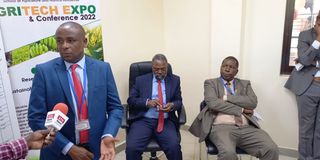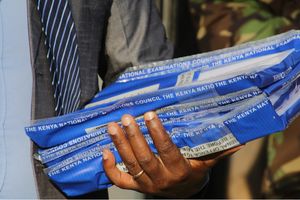Blue economy holds key to food security, says researcher

Kenya Marine and Fisheries Research Institute Director General James Njiru (left), Kisii University Ag DVC of Administration, Planning and Finance Prof Joseph Mailutha (centre) and Ag DVC Academics, Research and Students Affairs Prof Evans Basweti talk to the press after the official opening of the 2022 Agritechnology Expo at the University's main Campus on Wednesday.
As drought ravages parts of Kenya, scientists say a robust blue economy holds the key to achieving food security and creating jobs.
The fishing industry has not been fully exploited, said Prof James Njiru, the director-general of the Kenya Marine and Fisheries Research Institute (KMFRI).
He spoke when he opened the second Kisii University Agritechnology Expo at the main campus this week.
The first exhibition took place in 2019 but because of the global Covid-19 pandemic, it was not held in the last two years.
Prof Njiru noted that Kenya is not fishing tuna, which can earn it up to Sh90 billion annually.
But he reiterated that President Uhuru Kenyatta's administration had put in place measures to enable tuna fishing in its Indian Ocean waters.
"Tuna fish is one area that has not been tapped well. Countries like Seychelles and Mauritius are racking in billions … because they have made major steps and have well-trained fishermen. This is an area we are keen on and we have already started training Kenyan fishermen about the same," he said.
He gave the examples of upcoming fish factories in Liwatoni, Shimoni and Lamu, saying that when completed, they will revolutionise the fishing sector in Kenya.
"We used to lack information on stock assessment in our waters but the government has been pumping in more money. Our estimates show that we can get up to 300,000 metric tonnes of fish, up from the current 26,000," he added.
He said KMFRI is determined to increase the country's fish stock, and he gave the example of cage fish farming in Lake Victoria.
"We have close to 6,000 fish cages at the fresh water lake …. The cages have been instrumental in increasing our total tonnage apart from reducing conflicts among stakeholders in the fish industry," he continued.
Climate change threat
But he cited climate change as the main threat to the blue economy though the government is working to mitigate the effects.
"One of the measures that has already been taken is the planting of mangroves trees in a project dubbed Mikoko Pamoja. The trees absorb carbon 15 times more than terrestrial plants. We have planted these trees in most schools on the Coast."
Some counties in Kenya would not be staring at hunger if recommendations from scientists and researchers were implemented, said Prof Joseph Mailutha, Kisii University deputy vice-chancellor for administration, planning and finance.
"When we ask questions, we should look for answers. Let us learn to implement what researchers have told us,” he said.
Prof Evans Basweti, acting DVC for academics, research and student affairs, said: "The mandate of the university is to teach, research and engage in outreach activities. We have been teaching but the research part of it is what we are trying to showcase so that scientists can know what is happening in other fields.”
The theme of the two-day event is “agriculture innovations for sustainable livelihoods”. The exhibition will provide a platform to showcase new technologies and available agricultural inputs.





